Brad Warner's Blog, page 8
September 29, 2011
JUGGLING
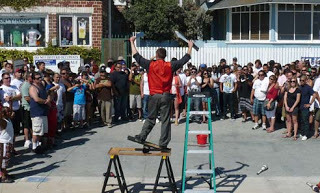
New SuicideGirls Safe For Work blog:
http://suicidegirlsblog.com/blog/brad-warners-hardcore-zen-juggling/
I'll let them have the exclusive for a couple days, then repost here. That is, if I remember.
Published on September 29, 2011 06:18
September 24, 2011
I. P. Frehley

I've had to cancel my retreat at Benediktushof. I apologize to everyone who signed up and to the staff at Benediktushof. But right now I'm in no condition to fly. With any luck, I'll be able to make the rest of my European dates.
Here comes the over-sharing part. Please do not read the following if you get grossed out easily. I'm sharing this mainly so that I do not have to keep telling the story over and over and over to the many people who are asking about it. If you're not curious, I suggest you not even read. This isn't pleasant.
Some people were guessing I had a colonoscopy Friday. You were close, but wrong. You missed by about six or seven inches. I don't want to brag, you see.
I had a little camera inserted into my weenie to have a look around up there. It's supposed to be a routine procedure with few complications other than discomfort. I was one of the lucky few for whom the procedure had some unexpected side-effects. No one yet seems to know why, but the procedure led to an inability to urinate.
Thus, screaming like a baby in agony, I had to be driven to the emergency room at about midnight by a long-suffering and very good friend. They placed a catheter in my thingy (hey all you people in San Francisco who don't like me not saying "cock" or "penis" -- Go suck my dick! But not yet. Wait about a week.) It's still there now and I will have to endure this for the next two days.
I can't say the catheter is painful. But it is extraordinarily uncomfortable in a way I wouldn't wish upon my worst enemy. It's just wrong to have a rubber tube up there. Consequently, although the folks at the ER said I could live a more-or-less normal life with this thing in, I have so far not really done so. If I sit very very still, I can let the thing sort of rest and then kind of forget about it. When I move around, it moves around too. It has subtle ways of reminding you that it's still there. Little pinches that I react to as if a crazed bald eagle were champing on the end of my wang -- although in truth the pain really isn't that bad.
I've always said that we should be aware that our independence is largely an illusion. We are not really independent at all. Nothing will remind you of this more clearly than having a medical procedure. I have been reduced to pure dependency. Though when you really look at it, your life is pretty much pure dependency no matter how healthy you are.
Friday was my first experience with anesthesia. It wasn't my first visit to an emergency room. I've taken other people to ERs before and I've been to the ER when I had kidney stones. But last night was my first visit to the Akron, Ohio General Hospital ER. Emergency rooms in Japan are quite different.
As for the anesthesia, that was the easy bit. I went out like a light at the first hint of drugs introduced to mys system. All I really remember was getting light headed then waking up. I initially thought the procedure went really well.
I didn't feel most of the pain they'd warned me I'd feel after the procedure. I was told I'd have a sore throat from the intubation. I barely felt anything. I was told I'd have pain urinating. But the first two times I went it wasn't that bad. It was a little sore. But I've had kidney stones, baby. That kind of sore is nothing!
But the third time I tried to go, nothing came out. I tried and tried for about two hours. You know how it feels when you hold your pee like in a long car ride or something? Imagine that times about 10,000. When at last I finally accepted that I was gonna need to be catheterized I was hurting bad (I'd called the ER & they told me about that possibility, I did not want another thing shoved up my weenie so I resisted).
The long-suffering and saintly Erin drove me to Akron General's emergency room. I was not in a good mood when I arrived. I guess they deal with a lot of distressed people in the ER. So the first person I spoke to had all of her professional defenses up. It was interesting to note. She was prepared for me to go off on her, as I'm sure others have in the past. But I didn't. I tried as best I could to articulate my problem.
Pretty soon I was in a room, waiting to be seen. Luckily the ER was not too crowded. But it still took them forever to get to me. I suppose having to pee really bad is not considered one of the more urgent concerns. Unless you're the one who has to pee real bad.
Finally a doctor came in an accessed my situation and the decision was made to insert a Foley catheter. Much as I dreaded that, I knew it would relieve my pain so I was all for it.
I shook like a maniac as the insertion was done. I'm not really sure if I started shaking before or during the insertion. But by the time they were finished it was like I had the most uncontrollable shivers you can possibly imagine. They said that was a common reaction and that it would subside. It did. But nearly two days later I still ache.
I nearly died on Friday night. Seriously. Without the ER I would have been dead, and it would have been a very bad death. But I'm not dead. So that's good. It's interesting how many things we consider to be fairly minor ailments these days are actually deadly. A wild animal in my predicament would have died. A person living in more primitive conditions would have too -- although such a person wouldn't have had the procedure that led to my ER visit in the first place. Still, a blocked bladder is actually pretty serious stuff.
The fact I could have died makes me very aware that I am extremely dependent upon others. I'm a guy who prides himself on independence, so this is something I often attempt to deny. But there ya go.
I've been reading a book lately called God Is Not One: The Eight Rival Religions That Run the World. The book takes the standpoint that the stuff we've been hearing for years about all religions being basically the same thing is bollocks. They aren't really the same at all. A Christian who tries to be nice by saying that Jews, Muslims, Hindus and Buddhists are also saved is missing the point. Those other religions don't consider it important to be saved.
Anyway, according to the author the goal of Islam is to free us from pride and arrogance and the feeling that we are independent of God. The ordeal I went through the other night has gone a long way to accomplishing that for me. It's hard to be proud when you're walking around carrying your day's accumulated urine in a big plastic bag connected to a garden hose shoved up your dick.
I'll just end there since I've gone on a very long time. I hope your weekend was better than mine!
Published on September 24, 2011 12:41
September 23, 2011
I (DON'T) WANNA BE SEDATED
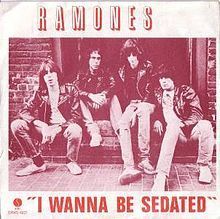 I'm gonna go to the hospital in a few hours and be sedated. I do not want to be sedated.
I'm gonna go to the hospital in a few hours and be sedated. I do not want to be sedated. The last time a doctor recommended a procedure for which sedation was required, I cancelled at the last minute. Actually, at that time I didn't know sedation was required. As soon as I heard it was, that's when I cancelled. As it turned out the reasons for the procedure turned out to be spurious (trust me, you don't want any further explanation than that). So I was fine. This time I feel like it may be necessary for them to go have a look at what they want to have a look at. Although I'm pretty certain it'll turn out to be nothing very serious.
The timing for this could hardly be worse. I'm doing this stuff on Friday and leaving for nearly two months in Europe on Sunday. People ask me how I prepare for these trips. The answer is "very badly."
I don't earn enough to pay for an assistant. So I have to set everything up myself. Luckily some very kind people over on the continent are booking me trains and planes and stuff. But I still have to coordinate it all. And I am very bad at that kind of thing. I'm not the kind of guy who really knows much about how to plan ahead.
Which is one of those weird questions I sometimes get. "If zen is all about being in the moment, are you allowed to plan ahead?" Yes, you are allowed to plan ahead. You plan ahead in the moment. You plan for two months in Europe now. Or at least you should. But if you're me, you barely do.
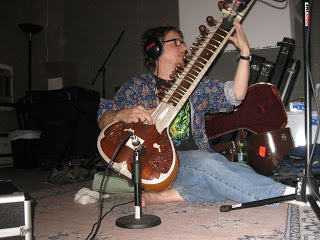
Plus a this week Zero Defex started recording what will eventually be its second album. I laid down some sitar on Wednesday. I be that's the first time a sitar was used by a hardcore band! The rest of the band will finish the tracks off while I'm away.
So I gotta go get sedated and still manage to pull together all the last minute stuff. Which is why this blog entry is short and messy.
I'm not a fan of drugs, as I think everybody who reads this knows. That includes even drugs that are "good for you," like the sedatives they give you in the hospital. I really don't want them. But I've heard what the procedure I'm going for is like without sedation and opted to get knocked out. Well, apparently not fully knocked out. They call the thing they're doing to me "twilight." I guess that means you're mostly knocked out. Knowing me, it'll put me under. Since I so seldom partake of drugs, whenever I do they knock me for a loop.
Anyhow, I figure if I write about the procedure maybe I can claim the whole thing as a tax write-off. Plus it may have some zen appeal. It is an altered state of consciousness after all. Not that zen is about altered states. But people who read about zen seem to like to read about altered states.
Good luck to me! See you on the other side!
P.S. Here's an interesting article by Susan O'Connel of San Fran Zen Center. Someone posted the link in the comments. Thanks.
Published on September 23, 2011 07:00
September 21, 2011
Bliss

Well, I give up folks. They've now made a drink that does exactly what Zen practice is supposed to do. I'm just gonna buy that stuff from now on. Lots easier!
http://iambliss.net/
According to the website:
When your mind is both calm and clear and your body relaxed, you will experience that sacred state of being called BLISS. The reason why most of us are denied the experience of BLISS is directly related to our lack of one, two, or all three states necessary for BLISS: calmness, clarity and relaxation. The miracle of a 2.5 oz. shot of I AM BLISS® is that it naturally, safely, and effectively promotes all three states of being. The result is BLISS.
The BLISS Experience: Although everyone's experience of BLISS is different there is a common theme. Almost immediately after drinking I AM BLISS® you feel a deep sense of relaxation, a letting go, as it were, of the problems and stressors that may have seemed overwhelming just minutes ago. Curiously, as you relax, your energy level noticeably increases. I AM BLISS® does not work like a typical relaxant that can make you drowsy.
Within ten to fifteen minutes the real miracle begins. The chatter, self talk and background noise that usually dominates your awareness subsides and you become more present. You may notice your surroundings more intensely. Colors, sounds, and shapes are more vivid, more interesting, more beautiful. You are now deeply rooted in the present moment. This may be the first time you have really experienced how it feels to be totally present.
Wow. Who knew? A one month's supply is only $120!
***
I'm working on my European jaunt. It starts this Sunday when I go winging off to Amsterdam. The full itinerary is at the following website:
http://web.me.com/doubtboy/Site/ZenTour2011.html
The date listed as Rotterdam on October 9 (John Lennon's birthday) has been moved to Amsterdam. And a date in Manchester, England has been added. I'll get the info up as soon as I can.
This is the last time I do one of these tours without some kind of secretary, assistant or jisha to help. Getting all the schedule right has just about made my head explode.
***
If I write about a medical procedure on this blog can I claim the procedure as a tax write-off? Cuz this shit I have coming up on Friday's gonna cost me two grand and probably won't amount to anything at all.
Published on September 21, 2011 12:00
September 18, 2011
The Making of Buddhist Modernism
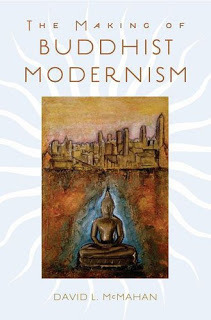
I recently bought a book called The Making of Buddhist Modernism by David McMahan. It's a pretty neat book about the way Buddhism has been transformed and "Westernized." The author also contends that this process of Westernization is not confined to Americans and Europeans who have misinterpreted Buddhism through their own cultural conditioning. It also includes Asians who have interpreted Buddhism according to their modern Westernized points of view. He sites DT Suzuki, Thich Naht Hahn, the 14th Dalai Lama and others as good examples of Asians who have Westernized Buddhism. He doesn't seem to think this is a bad thing. But he feels that we Westerners tend to accept what we learn of Buddhism as being present in its most ancient sources. But he questions whether that's true.
I've said several times that I feel like Buddhism is sort of like advanced physics. Albert Einstein pioneered so much of advanced physics it might be considered appropriate to call it "Einsteinism." But if we did that we would not want to stop all of advanced physics at the point of Albert Einstein's death and say anything that came after is not legitimate.
Same with Buddhism. Buddha never claimed to be a prophet or messiah. So to say Buddhism stops with the death of the historical Buddha would be a grave misunderstanding of Buddhism. Westernization and modernization of Buddhism is inevitable and helpful.
McMahan cites a passage by Jay Garfield regarding translation. Garfield says:
"When we translate, we transform in all of the following ways: we replace terms and phrases with particular sets of resonances in their source language with terms and phrases with very different resonances in the target language; we disambiguate ambiguous terms, and introduce new ambiguities; we interpret, or fix particular interpretations of texts in virtue of the use of theoretically loaded expressions in our target language; we take a text that is to some extent esoteric and render it exoteric simply by freeing the target language reader to approach the text without a teacher; we shift the context in which a text is read and used."
I was going over the galleys of Nishijima Roshi's translation of Nagarjuna's Fundamental Wisdom of the Middle Way. It's due out in about a month. In the translation, Nishijima Roshi insists upon translating the Sanskrit word shunyata as "the balanced state."
Everybody knows that the word shunyata means "emptiness." This is the accepted translation of shunyata and has been for many years. Nishijima himself is well aware of this. But he also felt that the word "emptiness" in English really did not convey what Nagarjuna was talking about when he used the word shunyata.
McMahan talks about the way the Sanskrit word moksha is translated as "freedom." This is an accepted and approved way of translating the word. But moksha means, in McMahan's words, "liberation from rebirth in samsara as an embodied being, as well as liberation from destructive mental states (klesas), craving, hatred, and delusion and from the suffering (dukha) they produce."
On the other hand, the word "freedom" conveys to Western readers such things as, "individual freedom, creative freedom, freedom of choice, freedom from oppression, freedom of thought, freedom of speech, freedom from neuroses, free to be me — let freedom ring" and so on. "Freedom" is a proper translation of moksha. But it means something very different from moksha.
"Balanced state" is an improper translation of shunyata. No doubt about it. But it may convey more of the meaning of shunyata than the word "emptiness" is able to. That was Nishijima's feeling anyway.
The translation is idiosyncratic. It does not match other English translations. But there are several more standard versions easily available to anyone who wants them. There is no reason for yet another one of those.
People worry themselves far too much about the Westernization and modernization of Buddhism. It's nice to have faithful versions of ancient texts. But we also have to be aware that even the most faithful versions we can produce are not faithful. Even if we read the texts in their original languages, we come from such a different place culturally we still won't be able to get what the people who wrote them meant exactly. Even the people who read those texts during the authors' lifetimes may not have fully understood what their writers meant.
It's hopeless!
Good luck.
***
Here are some helpful examples from the Nishijima text (slightly out of order from how they will appear in print):
Chaoter 4, Verse 8
vigrahe ya˙ parīhåram krte sunyatayå vadet
sarvam tasyåparihrtam samam sådhyena jåyate
* vigraha: m. keeping apart or asunder, isolation; division; independence. parīhåra: m. avoiding, shunning, caution; disrespect. kr: to do, make, perform, accomplish, cause, effect, prepare. sunyatayå: I. of sunyatå. sunyatå: f. emptiness, loneliness, desolateness; absence of mind, distraction. vadet: 3rd pers. opt. 1st conj. of vad. vad: P. Å. to speak, say, utter. parihrta: mfn. shunned, avoided; abandoned, quitted; taken, seized; n. what has been wrapped round or put on. sama: mfn. (connected with sa and with sama and samåna) any, every. sådhya: mfn. to be subdued or mastered or won or managed. jåyate: jan: to generate, beget, produce, create, cause.
[When one exists independently, one can keep one's attentive attitude and can speak from the balanced state.
In actual situations although nothing is shunned, all things and phenomena can manifest themselves in the state of regulation.]
--- If a person can live in the state of being truly independent, that person naturally prefers to keep an attentive attitude and can speak of everything in a stable manner. We cannot shun anything. Our lives are such that we are obliged to accept everything that occurs, whether we like it or not. Yet if we can maintain this truly independent attitude, it is possible for us to accept our circumstances in a balanced and regulated way.
The real universe should manifest itself clearly. If it were impossible for the real universe to manifest itself clearly, then the real universe could never become clear at all. The reason that the real universe does not seem to manifest itself clearly, comes from the unbalanced situation of our autonomic nervous system.
I am not a medical doctor or neurologist. But as a Buddhist teacher I value the work of these scientists. Their findings and theories are often useful in helping to clarify Buddhist philosophy and make it comprehensible to today's audiences by removing the air of mysticism that has surrounded these teachings for far too long. I have come to believe that what has been called satori or "enlightenment" by Buddhist masters of the past can be expressed in more contemporary terms as the balance of the autonomic nervous system.
One does not need to be a scientist or a physician in order to understand the basics of scientific theory or the basics of physiology. These days the basics of science and physiology are part of the common framework of human thought and understanding. Nor must one be a scientist of physician to use these terms. I am not trying to advance some new theory of science here. I am only using the theories science has already provided as a means of expressing Buddhist philosophy in more contemporary terms.
Science tells us that the human autonomic nervous system consists of two parts. These are called the sympathetic and the parasympathetic nervous systems. These two nervous systems, they say, work in opposition to one another. It is my belief that the workings of the sympathetic nervous system are the true basis for the philosophy we call materialism while the workings of the parasympathetic nervous system are the fundamental basis for the philosophy we call idealism or spirituality. When the sympathetic nervous system is in ascendancy we tend to feel materialistic. We become more involved with body than with mind. When the parasympathetic nervous system is stronger we feel spiritual. Our mind becomes clearer but we lose contact with our body.
The practice of zazen brings the two nervous systems into balance, allowing each one to function at equal strength. When this occurs there is what Master Dogen called "dropping off body and mind."
We will return to this idea again and again throughout the commentary, and I hope it will become clearer as we go along. For now we can just note that if we were to use our contemporary terminology, Nagarjuna appears to me to be saying here that until the autonomic nervous becomes balanced, it is impossible for the real universe to become clear. ---
Published on September 18, 2011 09:13
September 13, 2011
Interview With David Chadwick
Yesterday David Chadwick, the author of the books Thank You and Ok!: An American Zen Failure in Japan and Crooked Cucumber: The Life and Zen Teaching of Shunryu Suzuki was in Akron, Ohio and we hung out. I video recorded some of our conversation and here it is as my first ever video blog.
If you can't see that, go to this link:
http://youtu.be/fpII6K60408
David also put together a great book of anecdotes about Shunryu Suzuki called Zen Is Right Here: Teaching Stories and Anecdotes of Shunryu Suzuki, Author of "Zen Mind, Beginner's Mind" and he maintains a very cool and incredibly extensive website at cuke.com
And one more thing! This morning Patricia Snodgrass sent me a link to this great review of my latest book Sex, Sin, and Zen: A Buddhist Exploration of Sex from Celibacy to Polyamory and Everything in Between on facingnorth.net. Thanks Patricia!
If you can't see that, go to this link:
http://youtu.be/fpII6K60408
David also put together a great book of anecdotes about Shunryu Suzuki called Zen Is Right Here: Teaching Stories and Anecdotes of Shunryu Suzuki, Author of "Zen Mind, Beginner's Mind" and he maintains a very cool and incredibly extensive website at cuke.com
And one more thing! This morning Patricia Snodgrass sent me a link to this great review of my latest book Sex, Sin, and Zen: A Buddhist Exploration of Sex from Celibacy to Polyamory and Everything in Between on facingnorth.net. Thanks Patricia!
Published on September 13, 2011 10:16
September 6, 2011
The Dharma of George Carlin
The other day this video popped up on my Facebook page:
Those of you who aren't seeing that link, click here or type http://youtu.be/R37zkizucPU into your browsers. The clip came courtesy of Waylon Lewis who posted it as part of this article in his online journal Elephant.
Lewis drew the connection between what Louis C.K. says in this clip and the idea of having a teacher in Buddhism. I thought it was a brilliant and very apt connection. What Louis C.K. says he learned from George Carlin reminds me a lot of what I learned from my teachers Tim McCarthy and Gudo Nishijima. Louis C.K. did not set out to remake himself in the image of George Carlin. He didn't copy Carlin's offstage behavior. He didn't tell jokes that Carlin made up. He didn't set himself up as the new George Carlin.
And yet he learned the deeper truth embedded in Carlin's work and he learned how to make that truth his own. He learned how to express George Carlin's approach to comedy in his own way. If Carlin had had a lineage to pass on, he would have been right in passing it on to Louis C.K.
As Shunryu Suzuki said in 1962:
"If you want to meditate you must have (the) instruction of (the) right teacher, especially when you want to meditate at home. It will take at least six months before you get your own right posture. Everyone has their own right posture but without instructions you cannot find it. For it to be your true posture, there must be (the) spirit which is called (the) Essence of Mind. Without spirit it cannot be your own. So we say, 'When you become yourself then Zen becomes Zen.'"
Those of you who aren't seeing that link, click here or type http://youtu.be/R37zkizucPU into your browsers. The clip came courtesy of Waylon Lewis who posted it as part of this article in his online journal Elephant.
Lewis drew the connection between what Louis C.K. says in this clip and the idea of having a teacher in Buddhism. I thought it was a brilliant and very apt connection. What Louis C.K. says he learned from George Carlin reminds me a lot of what I learned from my teachers Tim McCarthy and Gudo Nishijima. Louis C.K. did not set out to remake himself in the image of George Carlin. He didn't copy Carlin's offstage behavior. He didn't tell jokes that Carlin made up. He didn't set himself up as the new George Carlin.
And yet he learned the deeper truth embedded in Carlin's work and he learned how to make that truth his own. He learned how to express George Carlin's approach to comedy in his own way. If Carlin had had a lineage to pass on, he would have been right in passing it on to Louis C.K.
As Shunryu Suzuki said in 1962:
"If you want to meditate you must have (the) instruction of (the) right teacher, especially when you want to meditate at home. It will take at least six months before you get your own right posture. Everyone has their own right posture but without instructions you cannot find it. For it to be your true posture, there must be (the) spirit which is called (the) Essence of Mind. Without spirit it cannot be your own. So we say, 'When you become yourself then Zen becomes Zen.'"
Published on September 06, 2011 09:01
September 2, 2011
What's Tassajara Like?
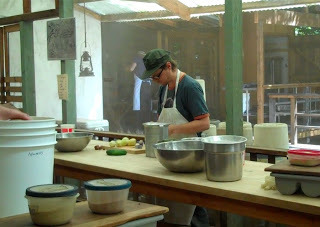
People wanted to know what Tassajara was like. That's an easy one so I'll tackle that now.
For me, this time, Tassajara was mostly like chopping vegetables and washing dishes. I was invited down by Greg Fain who is the tanto (practice leader) of the place and a good friend of mine. Each summer guest season the tanto and various other staff members can invite people down on a work exchange basis. These folks come to Tassajara and get to enjoy the place for a few days in exchange for doing some kind of work. One guy was a masseuse and gave free massages to residents, one guy was an accupuncturist. I was invited down to give some talks to the students.
The first time this happened was last year. But last year I decided that it was kind of boring just to lounge around for a few days and then give some talks. So I asked Greg if I could enroll as a Tassajara student for a month and give my lectures during that time. He said OK, so that's what I did. This year I did the same thing, but for just three weeks instead of four. I figured I needed a bit more time at home to get ready for my upcoming European tour.
Last year I got assigned to the dining room crew wherein I was basically a waiter most of the time. This year I was on kitchen crew where I mostly chopped and washed (see above).
How Tassajara works is like this. During the Fall/Winter and Winter/Spring its a full-time Zen monastery. Only those enrolled as monastic students are allowed in. They follow a strict monastic schedule, rising at 3:40 AM, sitting lots of zazen, working to keep the monastery running, and studying the classic Buddhist texts.
In the Summer, the place is open to the public as a hot springs based resort. Tassajara was operated as a resort from sometime in the late 19th century until the late 1960s when it was bought by the San Francisco Zen Center. The Zen Center is now funded in a large part by the money brought in during Tassajara's summer guest season.
The costs of running Tassajara are kept down by staffing the place entirely with unpaid Zen students. These students can earn credit to attend the Fall or Spring practice periods free of charge by working as resort staff. There are also other benefits. The students eat great food (albeit not always as great as the guests), get free room and board, and get to experience most of what Tassajara offers its guests.
Students also adhere to a modified version of the practice period schedule. They're woken up at 5:20 AM to sit an hour of zazen and attend a service. There are two other services during the day and a 40 minute period of zazen in the evening. In between they work at various jobs to keep the resort running. They may make beds, clean rooms, fix the gardens, or, like me, prepare the food, among other jobs.
There is no Internet access in Tassajara. Your cell phones won't work. There is one communal telephone, but this is shared with the guests. There's another phone in the porch behind the office that students can use in the evenings. But you risk your call being heard by everyone else hanging around out behind the office playing board games or reading.
Most students have a room to themselves. The rooms are small, but mostly nice. You're almost always going to have a few rodent friends in your room. But Tassajara is deep, deep in the wilderness. You soon learn that you're in their world, not the other way around. It's not so bad as long as you don't leave lots of food laying around your place.
Students are required to follow Tassajara's monastic rules. These are not nearly as strict as the Southeast Asian vinaya rules for monks or even the kind of rules one must follow during training at a Japanese monastery. But there are rules. You're supposed to keep silence during the hours after evening service and before breakfast. You must attend zazen and services. And you can't have sex unless you either enter Tassajara as a couple or both members of the couple have been there at least six months. They don't want their monastery being used as a place to hook-up.
My days were usually spent in the kitchen. The kitchen is run according to the model provided by Dogen in his
Published on September 02, 2011 09:33
August 31, 2011
Back to Civilization

I'm back from Tassajara. That's a photo of the full moon over the Tassajara valley. Did you miss me?
Man. A lot went on while I was away. Jani Lane died. I didn't see that one coming. I never knew Jani. But I was pals with Steve, who is also mentioned in the article I linked to, all through high school. I didn't realize Jani was also from Akron. I can't say I was ever the world's biggest Warrant fan. But among the LA hair metal bands of the time, they were far better than most. They could actually write songs that were about something, as well as dumber-than-dumb rockers like Cherry Pie. I actually really like that song and always have. "Think about baseball, swing all night!" Genius, I tell ya!
A bit closer to home for me, Tim LaFollette died last Tuesday. Tim was a close friend of my friend Catie Braly. I only met Tim once. But I heard a lot about him from Catie. Tim wrote the theme song to Dan Savage's Savage Love podcast. The last 5 minutes of the latest episode are a tribute by Dan Savage to Tim as well as one of Tim's best songs, "Sad State of Affairs." Catie sings on most of Tim's stuff that he did with their band The Popovers. Tim had ALS, aka Lou Gehrig's Disease. He was dedicated to raising awareness of the disease. I'm sad he's gone.
The other night I spent some time with my buddy Daigan Gaither of the San Francisco Zen Center. Daigan is a Zen monk and also one of the Sisters of Perpetual Indulgence. The Sisters are officially heretics according to the Holy Roman Catholic Church! Way to go, Daigan!
Daigan noted that my work is something people either really love or really hate. That seems to be true. And I'm glad of that. If I only inspired indifference I wouldn't be doing my job.
What can I tell you about Tassajara? I did three weeks there as a member of the kitchen crew. I chopped loads of vegetables, baked tons of cookies, and washed more dishes than I ever thought there were on Earth. I'd been invited down by Greg Fain, the practice leader, to give some talks. But, like last year, I thought it was boring just to go down there for three or four days, lounge around the hot springs baths, do a couple talks and leave. So I enrolled as a rank-and-file student. That's loads more fun and a lot more interesting and informative.
My first talk was called "Was Dogen Really Dogen?" I tried to address the issues raised by Carl Bielefeld and others recently concerning certain parts of the accepted biography of Dogen. Much of what we think we know about the man turns out to be dubious. It's doubtful, for example, that he wrote his masterwork on Zazen, Fukan Zazengi (Recommending Zazen for All People), in 1227 when when he first arrived back from China as a youngster of 27. More likely he wrote it about five years later and then extensively revised it in the 1240s, when he was an old man in his forties. Also, the stories of his wanderings in China looking for a true master are probably highly exaggerated by the contemporary Soto organization. Dogen himself never really claimed to have done a whole lot of traveling on the continent.
I said that I wonder if the matter of who our teachers "really are" is actually very important. Who one "really is" is a kind of fiction we create about ourselves and about others.
My second talk was about Dogen's views regarding monkhood. In a few of his later works, Dogen seems to directly contradict what he said in Fukan Zazengi about everyone being able to practice zazen and reach enlightenment. He says that only one who has "left home" (出家, shukke, pronounced shoe-kay)can ever hope to truly understand Buddhism.
In today's Japanese style Buddhism, what it means to "leave home" is a bit vague. Nishijima Roshi's definition is even more vague. In the old days, a "home leaver" really left secular society. He or she couldn't hold down a job, get married, handle money and so on. These days the Japanese Soto-shu and other such organizations permit "home leavers" to do all of those things and more. In America and Europe the rules have become even looser.
I once asked Nishijima Roshi, "Am I a monk?" He said, "Yes. You are a monk." In his eyes anyone who took the precepts automatically became a monk. My friend Konin spoke up during the talk. She said that she believed a monk was anyone who was committed to helping maintain whatever it is that supports people to do the practice. An interesting definition.
I've never lived in a monastery except for a few short stints at Tassajara. I did a month last year, three weeks this year, plus a few other odd days and weeks over the previous years. Nishijima Roshi never kept a temple or monastery. Neither did my first teacher. So the monastic life is still somewhat mysterious to me. What does it mean? What value does it have to contemporary society?
I'll try and get the recordings of these talks to John to put up on the podcast soon.
OK. I gotta go.
See ya later, skaters!
Published on August 31, 2011 09:39
August 26, 2011
I Am So Over This Buddhism Shit!

Brad is at Tassajara Zen Monastery where there's no Internet access. Here is one last oldie but goodie written for SuicideGirls to tide you over till he gets back.
So I'm sitting cross-legged in the meditation hall at the San Francisco Zen Center a couple days ago. Incense wafts through the air, bells are rung, ancient chants are intoned, and then profound silence descends. The assembled monks embark on their meditative journeys to the centers of their minds. All at once a thought bubbles up to the surface of my consciousness, like an arrow piercing the cold emptiness of the pre-dawn air.
I am soooo over this shit.
God how I fucking hate it. After 25 years of doing this stupid crap, stick a fork in me I am done. When I was a youngster the mere idea of sitting in a temple with a group of dedicated monks all pursuing the sacred Dharma gave me an iron-hard boner you could have sliced pound cake with. How I longed for that serenity, that peace. How I fantasized of ascending to the heights of Supreme, Unsurpassed, Perfect Enlightenment. How I dreamed of the day I might be in the very spot I'm in right now, living the life of a wandering monk, flitting here and there from temple to temple absorbing the words of the wise and dispensing my own wisdom to those new to the Way, spending my days deepening my practice.
But god-dammit I'd rather be at Amoeba Records right now. It's just up Haight Street. I could be there in 20 minutes. I think that new Om record must be out by now, the one they recorded live in Jerusalem. Maybe even that new Robyn Hitchcock boxed set. But noooooo. I not only signed up for this shit, I signed up to do a five-day long zazen intensive at the Berkeley Zen Center right afterwards, followed immediately by two weeks cloistered at Tassajara monastery deep in the mountains of Carmel Valley - where there are no record stores at all. Fuck. What in God's name was I thinking?
One of the greatest things about Zen practice is that it's incredibly portable. You don't need anything special. You don't need a temple or monastery. You don't need to memorize any chants or read any books. You don't need a congregation. Zen goes anywhere you go. You can do your sitting on a rolled up towel in your dorm room, which is how I started.
But human beings like to do things together. We're social creatures. And so a monastic tradition also developed within Buddhism. A lotta folks think that if you're not hip to the monastery thang you ain't no Buddhist. They're wrong. Shakyamuni himself did not come to his understanding as a member of any religious order, and there is a laundry list as long as your arm of other great teachers who either shunned monastic life, or came to monastic life after establishing the Way on their own, or who did a bit of the monastic stuff when it was necessary but largely stayed away from it. The non-monastic tradition in Buddhism is just as vital as the monastic one.
But the pull towards making Buddhism a social thing, and only a social thing, is strong. In America, we seem dead set on turning Buddhism into a string of socially agreed upon cliches and buzzwords.
A couple weeks ago or so I put a post up on my blog in which I moaned about some of the buzzwords and neo-traditions that have become au currant among American Buddhists these days. One was that dependable puppy dog of a word, "mindfulness." Christ I hate that word. The word seems to indicate some vague state of thinking hard about what you're doing. And I know we're all taught that we should think about what we're doing. But that's not the Buddhist approach. Do what you're doing. When thinking becomes a distraction, stop thinking and get back to doing. I'm also sick to death of hearing hipster Buddha dudes use the word "skillful" to describe things they like and "unskillful" to describe things they don't. It's a total misuse of the old Buddhist idea of upaya, or "skillful means," by which ancient Buddhist teachers are said to have taught in unorthodox ways. These days it just means whatever's under discussion didn't rub the guy who called it "skillful" the wrong way. I'm also fed up with the concept of the "dharma talk," which has come to mean something like, "guys in funny robes using buzzwords like 'mindfulness' and 'skillful' to lull people who think of themselves as 'spiritually minded' to sleep." I'm tired of watching entire audiences nod out like opium addicts while smiling knowingly whenever a favorite word or phrase floats through the haze.
Whatever. Anyway, after I said this stuff a whole buncha folks got really mad about it. Fine. Be as mad as you want. I, myself, am not the least bit angry about this. I was just fed up with it and continue to be fed up with it.
Back when I was first in punk rock, the thing that irked me the most, and finally drove me out of punk rock altogether, was the fact that the philosophy we espoused was all about questioning things. And yet you were not allowed to question punk rock itself. It was great to question Reagan and nuclear proliferation and the cops and school. But if you started asking things like, why do we all have to wear leather jackets, or why can't we have vocal harmonies in some of the songs, or why can't I grow my hair long if I want, that was taboo.
American Buddhism as it stands today is pretty much the same way. Buddhism isn't that way. But the stuff that lotsa people call "Buddhism" is. It's a subtle distinction, I know. But an important one.
So when I started calling bullshit on the idea of mindfulness, and skillfulness and "dharma talks," the reaction was almost identical to what used to happen when I'd go onstage at hardcore shows in the early 80s with long hair and bell-bottoms. You can't do that! We can challenge everything in the world, but don't you dare challenge us!
If Buddhism can't be challenged it isn't Buddhism anymore.
We're all looking for a place to settle. We want stability. We want something dependable. Buddhism is all about addressing that very issue. It aims for the ultimate stable resting place. But Buddhism takes things in a very different direction from our habitual way of dealing with our longing for stability. Religions and subculture movements like punkrock want to reduce things to formulas. Believe that Jesus Christ is the one true Son of God and you're all right. But the words "Jesus Christ is the one true Son of God" mean something absolutely different to each individual who uses them. Words such as "mindfulness" and the like take on all kinds of different meanings when they reach the mass culture. And when they stop meaning anything useful it's time to retire them.
This is hard for lots of folks to get a grip on. They want Buddhism to be like a bumper sticker, "Buddha said it, I believe it and that settles it." But that's not the Buddhist way.
At any rate I'm totally over all that stuff big time. And yet, by the time you read this I'll be finishing up one retreat and heading off to another — being all "mindful" and listening to skillfully delivered Dharma talks.
Sometimes even when you're over stuff you still gotta do it anyway. Sometimes you gotta do it especially when you're over it.
Published on August 26, 2011 21:08
Brad Warner's Blog
- Brad Warner's profile
- 595 followers
Brad Warner isn't a Goodreads Author
(yet),
but they
do have a blog,
so here are some recent posts imported from
their feed.



